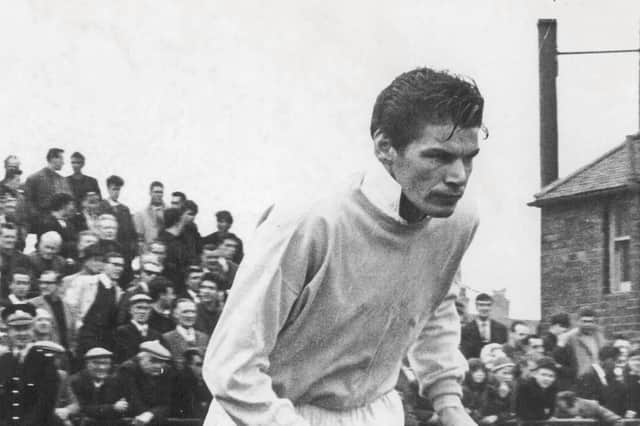Obituary: Willie Whigham, Falkirk footballer known for laid-back attitude


Willie Whigham was a well-known Scottish footballer of the 1960s and early ‘70s who played 465 games with distinction on both sides of the Border, for Falkirk and Middlesbrough. Despite a lanky and non-athletic appearance, he was a gifted goalkeeper who on his day was capable of wonderful saves. He was touted several times for international honours and considered unfortunate not to be capped, no doubt due to his extremely laid-back character and the football establishment’s perception of his individualistic demeanour which Sinatra may have had in mind when he sang “I Did It My Way”.
Those attributes, however, combined to make him a huge favourite with fans at both clubs, where he was enormously popular and a totemic figure. So much so that when he left Falkirk for the Teesside club, five coachloads of Falkirk fans travelled to Watford to watch him make his English debut, while at Middlesbrough fans soon fashioned their own terracing chant in his honour, “We’ve got Willie Willie Willie Willie Whigham in our goal, in our goal!”
Advertisement
Hide AdAdvertisement
Hide AdWilliam Murdoch Morrison Whigham was born in Airdrie, the eldest of four children of Hugh, a council employee, and Jeanie. Along with siblings Hugh, George and Jean, Willie was brought up in the Thrashbush area of the town and initially attended Chapelside Primary school before going to Airdrie Central Secondary. He began as a goalkeeper at primary school where he enjoyed success in local cup competitions, and later progressed into Junior football with the now defunct Strathclyde club, then based at Springfield Park near Parkhead. At the same time he undertook a motor mechanic’s apprenticeship in Glasgow, after which he was employed by Dalziel’s Bakery in that capacity.
Meanwhile his good form for Strathclyde was attracting attention, leading to a trial with Clyde in 1958. After joining another Junior side, Shotts Bon Accord, he played once for Albion Rovers before signing for Falkirk in August 1960, at the same time as Shotts teammate and future internationalist John Hughes joined Celtic.
Falkirk badly needed a consistent goalkeeper, having tried several without success, and Willie made a good start with his debut against Montrose being reported as “an extra good match”. Eight clean sheets helped the Brockville club gain promotion to the top tier where they would remain during Willie’s time there. His consistently good displays in a regular “back three” of “Whigham, Lambie and Hunter” soon had bigger clubs looking at him, including Rangers and Celtic, but Falkirk would not sell to another Scottish club.
English clubs including Birmingham City and Southampton were also showing interest, which came as no surprise to former teammate and captain John Markie: “Willie was a first class keeper, he had excellent reflexes, was good at dealing with cross balls and commanded his area well. He was quite a character, he could be outspoken sometimes and maybe if he had toed the line a bit more he would have gone on to bigger things, but was a great player for Falkirk.” In later years Willie was a popular guest at club functions and he was inducted into their Hall of Fame in 2001.
After 251 games he was transferred in October 1966 to Middlesbrough for £10,000, with goalkeeper Eddie Connachan going in the opposite direction. The English side had just been relegated to the old 3rd Division and were in some disarray. New manager Stan Anderson set about rebuilding, with Willie a key part of that process as some 16 players were released. His strategy succeeded, with the team gaining promotion to the old 2nd Division (now the Championship) in Willie’s debut season, during which he established himself as the club’s first choice keeper and got into the fans’ affections, and was soon christened “The Whig”. During his time at Ayresome Park the team twice came close to promotion, with 4th place finishes in 1969 and ’70 – they were never lower than 9th.
His self-willed nature brought occasional problems, such as his submitting a transfer request in 1968 for higher wages, and then being suspended briefly in December 1969 after a training ground flare-up with a trainer, both of which were amicably resolved and did not affect his excellent form between the posts. Highlights included his displays against Manchester United in February 1970 in the quarter final of the FA Cup which Middlesbrough only lost after a replay when his performance outclassed English internationalist Alex Stepney in United’s goal; it was described by the watching Scottish selector Tom Fagan as “a superb display”.
In 1972 he was freed to join Dumbarton and thereafter went to Darlington, playing in total about a dozen games before retiring in 1974. After suffering a heart attack in the mid-Seventies he made a good recovery and returned north to live in Airdrie, where he worked for a company specialising in ground investigation drilling until an accident obliged him to retire in his sixties.
In retirement he enjoyed a visit to the pub and still followed football, attending Rangers games from time to time.
Advertisement
Hide AdAdvertisement
Hide AdMany warm tributes have been paid, including one from a Boro fan: “He was a throwback to days when footballers were genuinely loved by the communities in which they lived, and Willie certainly was.”
His marriage, during which he and his wife had sons Stephen and Stuart, ended in divorce and he is survived by his sons, four grandchildren and four great grandchildren.
Obituaries
If you would like to submit an obituary, or have a suggestion for a subject, contact [email protected]
A message from the Editor
Thank you for reading this article. We're more reliant on your support than ever as the shift in consumer habits brought about by coronavirus impacts our advertisers.
If you haven't already, please consider supporting our trusted, fact-checked journalism by taking out a digital subscription.
